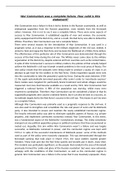War Communism was a complete failure. How valid is this
statement?
War Communism was a failure in that it led to famine in the Russian countryside, as well as
widespread opposition from the Russian population, most notably from the Kronstadt
sailors. However, this is not to say it was a complete failure. There were some aspects of
success to War Communism; it established equality of men and women; the economic
policy equipped and fed the Red Army, and as a result, the Red Army was able to defeat the
Whites. Therefore, War Communism was not a complete failure.
There were several reasons for the introduction of War Communism. It was used in a
pragmatic sense, as it was a response to the military exigencies of the civil war. Indeed, it
aimed to feed and equip the Red Army and increase the likelihood of a White Army defeat.
The effectiveness of this particular aim of War Communism was demonstrated through the
success of the Red Army during the civil war. The Whites never came close to the military
organisation of the Red Army, despite external aid from countries such as the United States.
In spite of War Communism’s success in military matters, the policies of that actually helped
achieve the Bolshevik’s civil war triumph created problems in the rural areas of Russia. The
new policy meant that the peasants were being made to produce a quota of crops in an
attempt to get food for the soldiers in the Red Army. Cheka requisition squads were sent
into the countryside to take the peasantry’s grain by force. During the years between 1918-
21 the sqads systematically terrorised peasants after Lenin’s order to ‘mercilessly surpress’
them; kulaks were targeted for particularly brutal treatment and whole villages would be
massacred. Even less food became available as a result and by 1921, War Communism had
triggered a national famine. A fifth of the population was starving, whilst many even
resorted to cannibalism. Therefore, War Communism can be considered a failure in that its
supposedly pragmatic aims caused a national famine, but it can also be seen as a success, as
its methods largely led to the Red Army’s success in the civil war. This means it can’t be seen
as a complete failure.
Although War Communism was primarily used as a pragmatic response to the civil war, it
was also used to strengthen and consolidate the role and power of Lenin and his Bolshevik
party, it also intended to ensure and maintain the newly established Communist regime.
The heavily enforced policy was able to eliminate capitalist aspects of Russia, e.g. private
property, and implement communist economics instead. War Communism, in this sense,
was a fundamental aspect of the Bolsheviks’ revolutionary strategy. The cheka senselessly
stamped out any political opposition groups or political resistance that they encountered or
rooted out. Arguably, this aim within War Communism wasn’t a failure and was largely
successful, as Bolsheviks remained in power, and the communist regime was kept until
1991-2. In spite of the successful maintenance of Bolshevik power, some of the methods
used as part of the policy were massively unpopular. This was demonstrated through the
Kronstadt uprising that took place in March 1921, the naval soldiers wanted greater
freedom. Many took part but the Red Army quickly and brutally put it down, many died.
This incident was particularly significant, as the people that resided in the area of Kronstadt
previously formed the ‘pride and glory of the Russian revolution’ but were now extremely
unhappy with the conditions of War Communism, as well as the communist regime in
general. War Communism was a failure in the sense that it was massively unpopular. Many





